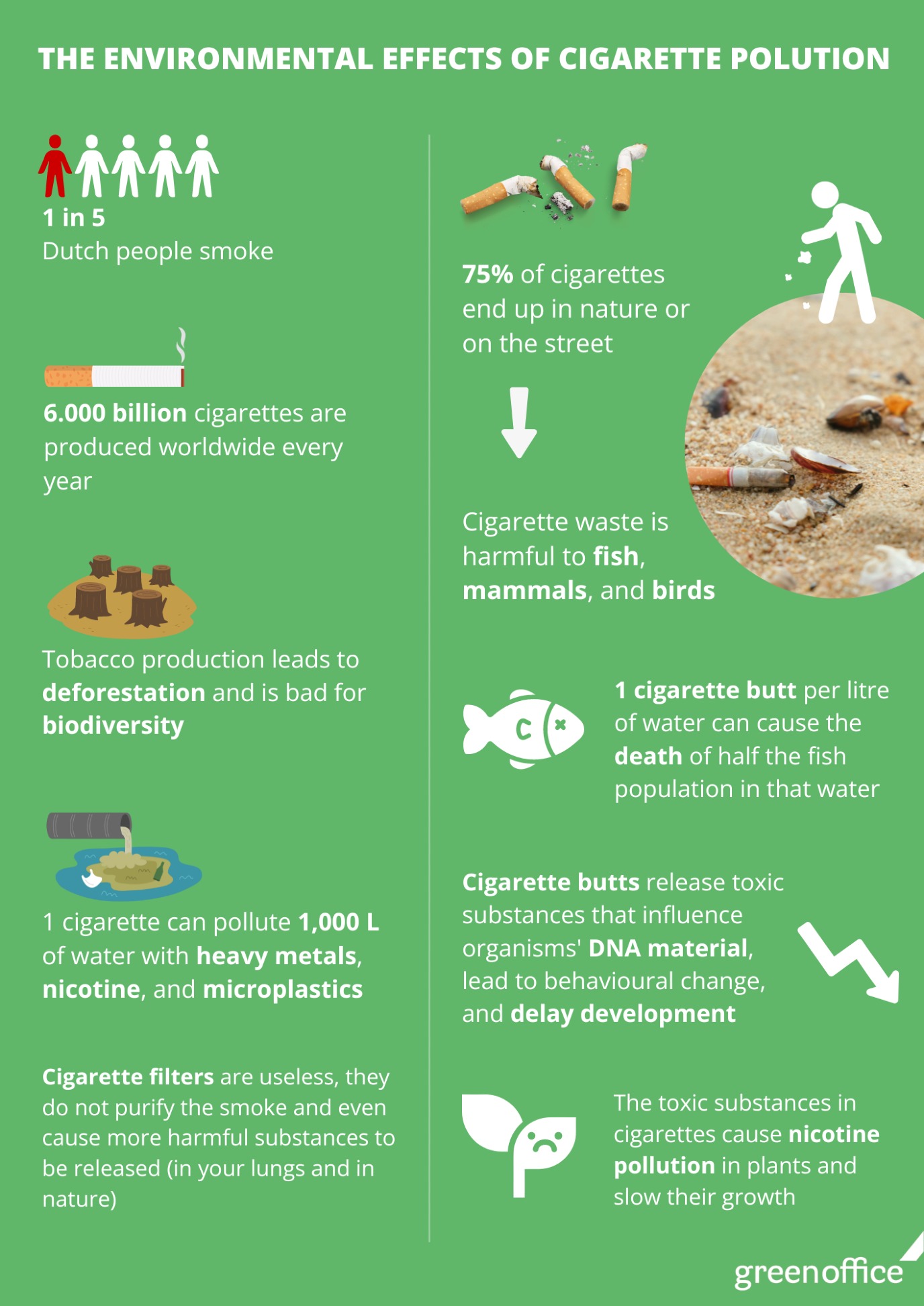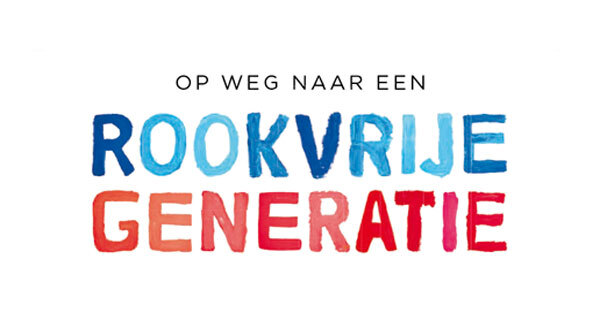RUG Rookvrij
Vanaf 2020 is het volgens de Tabaks- en rookwarenwet niet meer toegestaan om te roken op de terreinen van onderwijsinstellingen in heel Nederland. Dit houdt in dat alle terreinen van de RUG rookvrij moeten zijn.
Het verbod op roken geldt voor iedereen die zich op een RUG-terrein bevindt; studenten en medewerkers, maar ook leveranciers en bezoekers. Dit is aangegeven met borden en andere aanduiding, zoals blauwe lijnen. Op de lange termijn streeft de universiteit ernaar om de aanspreekcultuur onder staf en studenten te normaliseren. Zie je iemand roken? Spreek diegene dan vriendelijk aan en wijs op het feit dat het RUG-terrein rookvrij is.
Op deze pagina's vind je o.a. meer informatie over de rookvrije universiteit, stoppen met roken, sigaretten en het milieu en veelgestelde vragen.
Waarom rookvrij?
Vanaf 2020 is het volgens de nieuwe Tabaks- en rookwarenwet niet meer toegestaan om te roken op de terreinen van onderwijsinstellingen in heel Nederland. Hiermee creëren we een rookvrije omgeving voor medewerkers, studenten en bezoekers. De RUG is trots een steentje bij te kunnen dragen aan een rookvrije generatie.
Speerpunt Healthy Ageing
Een van de speerpunten van onderzoek aan de Rijksuniversiteit Groningen is healthy ageing. De Rijksuniversiteit vindt het van groot belang dat we in goede gezondheid ouder worden en daar zetten wij ons voor in. Leidend hierin zijn de Aletta Jacobs School of Public Health en de hierbij aangesloten onderzoekscentra. Het landelijke verbod op roken op onderwijsinstellingen sluit aan bij de zichtbaarheid van dit belangrijke speerpunt.
Rookvrije Generatie
De beweging 'Op weg naar een Rookvrije Generatie' is een initiatief van de Hartstichting, KWF Kankerbestrijding en het Longfonds. Het doel van de rookvrije generatie is dat er in 2040 geen enkel kind meer rookt of ooit gaat roken. Lees meer in het Nationaal Preventie Akkoord.
Samen op weg naar een Rookvrije Generatie.

Feiten en cijfers
Wie roken er?
In 2023 rookte 19% van de bevolking van 18 jaar en ouder. In 2014 rookte nog 25,7% van de volwassen bevolking. Jongeren tussen 20 en 29 jaar roken relatief het vaakst. In de leeftijd van 25 tot 30 jaar bevinden zich de meeste rokers, namelijk 29,3% en 17,7% dagelijkse rokers (bron: Trimbos).
Roken is verreweg de belangrijkste oorzaak van ziekte en sterfte in Nederland. Ruim één achtste van de totale ziektelast in Nederland is toe te schrijven aan roken (bron: Loketgezondleven).
Stoppogingen
Zo’n 80% van de rokers wil stoppen met roken. Ieder jaar voegen ruim 1 miljoen rokers de daad bij het woord en doen één of meer stoppogingen. In 2023 deed 34,4% van de rokers een serieuze stoppoging. De meeste rokers hebben meerdere pogingen nodig voordat het hen lukt om definitief te stoppen (bron: Trimbos).
Hoe slecht is meeroken?
Wanneer je tabaksrook van iemand anders inademt, ben je passief aan het roken. Aan meeroken zitten ook gezondheidsrisico’s. Zo heb je grotere kans op longkanker, baby’s verhoogde kans op wiegendood, en verhoogde kans op luchtweginfecties en astma. Meerokende kinderen hebben een grotere kans later zelf te gaan roken (Hopman & Croes). Zien roken doet roken.

Stoppen met roken
Stoppen met roken heeft altijd zin, ook voor een korte periode. Lees hieronder wat stoppen met roken doet voor je gezondheid:
-
Na twintig minuten dalen de bloeddruk en hartslag
-
Na twaalf uur is het koolmonoxidegehalte in het bloed weer normaal
-
Na twee tot twaalf weken zijn de longfunctie en bloedsomloop verbeterd
-
Na een tot negen maanden is de rokershoest weg en heeft de ex-roker meer adem
-
Na een jaar is het verhoogde risico op coronaire hartziekten gehalveerd
-
Na vijf tot vijftien jaar is het risico op een beroerte gelijk aan dat van een niet-roker
-
Na tien jaar is het verhoogde risico op longkanker gehalveerd en het risico op andere kankersoorten verminderd
-
Na vijftien jaar is het risico op coronaire hart- en vaatziekten gelijk aan dat van een niet-roker
Los van alle gezondheidsvoordelen scheelt stoppen met roken je ook veel geld. Rokers die een pakje sigaretten per dag roken besteden hier in 2024 ongeveer €4000 per jaar aan.

Hulp voor rokers
Je kunt op verschillende manier hulp zoeken als je wil stoppen met roken. Dit kun je doen via:
-
De zorgverzekering: het basispakket van elke zorgverzekering vergoedt eens per jaar een stoppen met roken cursus.
-
Huisarts: je kunt naar je huisarts gaan voor advies. Deze helpt met korte stopadviezen en kan je doorverwijzen naar een stoppen-met-rokenprogramma. Zorgverzekeringen vergoeden vanaf 2020 deze programma’s volledig en deze komen niet voor rekening van het eigen risico.
-
Nicotinepleisters of -kauwgom: nicotine-vervangende middelen koop je bij de drogist of apotheek. Deze middelen kun je gebruiken ter vervanging van een sigaret.
-
www.ikstopnu.nl : op deze website van het Trimbos-instituut staat veel informatie over stoppen met roken.

Sigaretten en het milieu
Roken geeft niet alleen overlast, maar is ook slecht voor het milieu. Wereldwijd belandt ongeveer 75% van de sigarettenpeuken op straat of in de natuur, met als gevolg dat de giftige stoffen uit de tabak (en de additieven die hierin zitten) en het filter een bedreiging vormen voor natuur en dieren.
Sigarettenafval heeft met name een vervuilend effect op grond- en oppervlaktewater, de organismen die hierin leven en op de groei van planten. Één sigarettenpeuk kan 1000L water vervuilen met zware metalen, microplastics en nicotine.
Lukt het niet om te stoppen met roken? Voorkom dan in ieder geval dat jouw sigarettenpeuken op straat of in de natuur belanden!

Online tools
Websites met informatie en tips
Apps
Cijfers laten zien dat 90% van de gestopte rokers een jaar na het stoppen weer opnieuw begonnen is. Begeleiding vergroot de kans dat gestopte rokers zich aan hun voornemens houden. Gebruik van bewezen effectieve hulpmiddelen bij stoppen met roken vergroot de kans op succes.
Ikstopnu.nl heeft een aantal apps geselecteerd die je kunnen helpen om te stoppen met roken. Deze apps geven je steun als je stopt met roken en helpen je om het vol te houden.
Partners
De beweging ‘Op weg naar een Rookvrije Generatie’ is een initiatief van de Hartstichting, KWF Kankerbestrijding en het Longfonds vanuit de samenwerking Gezondheidsfonden voor Rookvrij. Website: https://gezondheidsfondsenvoorrookvrij.nl/

Het doel van de Rookvrije Generatie is om ieder kind dat geboren wordt, de kans te geven om volledig rookvrij op te groeien. Website: https://rookvrijegeneratie.nl/

Healthy Aging Network Noord Nederland (HANNN) is een zelfstandige stichting, in 2009 opgericht om bij te dragen aan Meer Gezonde Jaren in Noord-Nederland. Hoe zorgen we voor een omgeving die het makkelijker maakt om gezond te leven? Op basis van die vraag bouwt HANNN coalities op het vlak van gezond wonen, sport en bewegen, zorg dichtbij (personalized & customized health), gezonde voeding en gezonde vaardigheden. Website: https://www.hannn.eu/

Het TRIMBOS Instituut ontwikkelt, implementeert en verspreidt kennis en expertise over roken en tabaksontmoediging. Door voorlichting aan het algemeen publiek en samenwerking met professionals, wetenschap en overheden willen we bijdragen aan minder ziekte en sterfte door tabaksgebruik. Website: https://www.trimbos.nl/kennis/roken-tabak

De website ikstopnu.nl is gemaakt door het Trimbos-instituut. In opdracht van het Ministerie van Volksgezondheid, Welzijn en Sport. Het staat vol met handige tips om te stoppen met roken: Website: https://www.ikstopnu.nl/

Veelgestelde vragen
Waarom mag ik niet meer roken op de campus?
Dit heeft alles te maken met de Tabaks- en rookwarenwet die het vanaf 1 augustus 2020 verbiedt om te roken op terreinen van onderwijsinstellingen.
Waar mag ik nog wel roken?
Roken is alleen toegstaan buiten RUG-gebouwen en terreinen. De gehele Zernike Campus is dan ook rookvrij. We willen je vragen om op te letten aan de randen van de rookvrije terreinen en hier geen rookoverlast te veroorzaken.
Wanneer geldt het rookverbod?
Het rookverbod geldt 24/7 op alle terreinen van de RUG.
Geldt het rookverbod alleen voor sigaretten?
Het rookverbod geldt voor traditionele tabakswaar, elektronische sigaretten, waterpijpen, kruidensigaretten en nicotinevrije tabakswaar.
Waar gooi ik mijn peuk weg?
Je kunt je peuk na het doven weggooien in de metalen afvalbakken die overal in de stad te vinden zijn. Is er geen afvalbak in de buurt? Gebruik dan een zakasbak. Je kunt bij de Green Office (Visserstraat 49) een gratis zakasbak afhalen van Groningen Schoon Dankzij Mij. We willen je wel vragen om je aan de huisregels te houden en niet te roken op RUG-terreinen.

| Laatst gewijzigd: | 13 mei 2024 14:28 |
